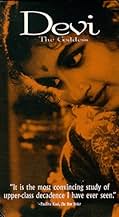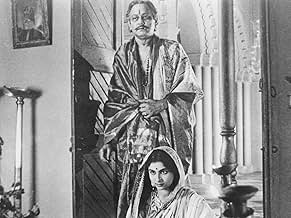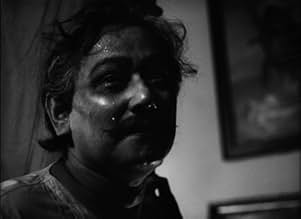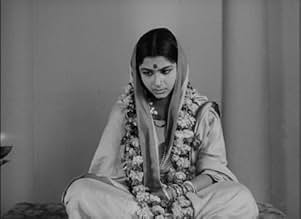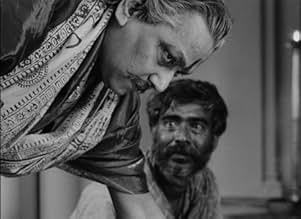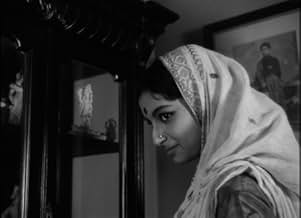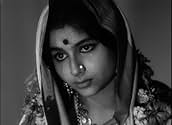IMDb-BEWERTUNG
7,7/10
3070
IHRE BEWERTUNG
Füge eine Handlung in deiner Sprache hinzuA young woman is deemed a goddess when her father-in-law, a rich feudal land-lord, has a dream envisioning her as an avatar of Kali.A young woman is deemed a goddess when her father-in-law, a rich feudal land-lord, has a dream envisioning her as an avatar of Kali.A young woman is deemed a goddess when her father-in-law, a rich feudal land-lord, has a dream envisioning her as an avatar of Kali.
- Regie
- Drehbuch
- Hauptbesetzung
- Auszeichnungen
- 1 Gewinn & 1 Nominierung insgesamt
Soumitra Chatterjee
- Umaprasad
- (as Soumitra Chattopadhyay)
Karuna Bannerjee
- Harasundari
- (as Karuna Bandyopadhyay)
Purnendu Mukherjee
- Taraprasad
- (as Purnendu Mukhopadhyay)
Arpan Chowdhury
- Khoka - Child
- (as Shriman Arpan Chowdhury)
Anil Chatterjee
- Bhudeb
- (as Anil Chattopadhyay)
Empfohlene Bewertungen
Being a Bengali, I had the privilege to read the original story by Prabhat Kumar from which the screenplay was adapted, and the story had a concrete conclusion with a deep impact where Ray finished it with surrealism and abstraction. Mostly he avoided the actual ending to bypass the social stigma which prevailed at that time. Also the story provides a very intimate adoration between the lead couple which was also avoided for probably the same reason.
Apart from that it possesses all the characteristics of Ray's direction with thrilling music, cinematography and screenplay. Definitely a must watch.
Apart from that it possesses all the characteristics of Ray's direction with thrilling music, cinematography and screenplay. Definitely a must watch.
After watching Satyajit Ray's The Apu Trilogy (1955-1959), which are now my favourite films of all time, I was looking forward to watching Devi, the next film Ray directed after The Apu Trilogy. Although I couldn't feel the same kind of emotional connection with the characters in Devi that I felt in The Apu Trilogy, this film was thought-provoking and very intriguing to watch.
Devi dealt with a serious issue in Bengali society at the time in a mature manner and Ray's direction and cinematography for this film was just as superb as The Apu Trilogy. It starred Soumitra Chatterjee and Sharmila Tagore once again as a married couple, like in Apur Sansar (the final part of The Apu Trilogy). However, whereas it was Soumitra who played the lead role in Apur Sansar, this time it's Sharmila who plays the lead role in Devi. Her performance was very subtle for the first half but her delusional performance towards the end was very convincing. Overall, I'd highly recommend this movie to any Satyajit Ray fan.
8/10
Devi dealt with a serious issue in Bengali society at the time in a mature manner and Ray's direction and cinematography for this film was just as superb as The Apu Trilogy. It starred Soumitra Chatterjee and Sharmila Tagore once again as a married couple, like in Apur Sansar (the final part of The Apu Trilogy). However, whereas it was Soumitra who played the lead role in Apur Sansar, this time it's Sharmila who plays the lead role in Devi. Her performance was very subtle for the first half but her delusional performance towards the end was very convincing. Overall, I'd highly recommend this movie to any Satyajit Ray fan.
8/10
Examining the dangers of blind faith & superstitious beliefs through the adversity of a young woman who finds herself deified by her father-in-law following a vivid dream, Devi captures the absurdity of religious delusion and the oppressive role a patriarchal society plays by not giving women their own voice even when they are held to a divine status.
Written & directed by Satyajit Ray (The Apu Trilogy & The Music Room), the story aptly introduces us to all the characters before the main plot surfaces but once it kicks into action, things only get more tragic & heartbreaking from there on. Ray makes sure his critique doesn't mock the Hindu religion, and is mainly concerned with the grave consequences of such blind conviction.
The religious fervour that erupts from one man's idiotic interpretation of a dream is depicted with both honesty & understanding. The splendid camerawork, steady pace & skilful editing do their part but what makes the ride so gripping, involving & interesting is the strong & sincere performances from the committed cast, with Sharmila Tagore impressing the most in the designated titular role.
Overall, Devi (The Goddess) is yet another socially relevant film from Satyajit Ray that tackles a sensitive subject matter with elegance & composure, and delivers a rich, evocative & thought-provoking experience. As is the case with most films of this esteemed auteur, the story brims with a timeless quality, the social themes it addresses have a universal appeal, and the sensible storytelling makes it worth a shot.
Written & directed by Satyajit Ray (The Apu Trilogy & The Music Room), the story aptly introduces us to all the characters before the main plot surfaces but once it kicks into action, things only get more tragic & heartbreaking from there on. Ray makes sure his critique doesn't mock the Hindu religion, and is mainly concerned with the grave consequences of such blind conviction.
The religious fervour that erupts from one man's idiotic interpretation of a dream is depicted with both honesty & understanding. The splendid camerawork, steady pace & skilful editing do their part but what makes the ride so gripping, involving & interesting is the strong & sincere performances from the committed cast, with Sharmila Tagore impressing the most in the designated titular role.
Overall, Devi (The Goddess) is yet another socially relevant film from Satyajit Ray that tackles a sensitive subject matter with elegance & composure, and delivers a rich, evocative & thought-provoking experience. As is the case with most films of this esteemed auteur, the story brims with a timeless quality, the social themes it addresses have a universal appeal, and the sensible storytelling makes it worth a shot.
"Devi" (Hindi, 1960): Directed by Satyajit Ray, and banned in India until the intercession of Nehru, this is the story of a lovely 17 year old wife, who is suddenly labeled as a "Goddess" (while her husband is absent to complete his final exams in college), due to a dream ("vision") by her father-in-law. What follows is a fascinating, multi-angled look at the transitional Indian culture (and MOST cultures, frankly). Is this any different, any worse, or any more desperate than seeing the face of Jesus in a grilled cheese sandwich or the grain of a wooden door? Is her overnight change in status unique? Are the people who have confused motives, hopelessness, or malleable minds any less vulnerable here and now? The quality of the video copy I viewed was rough a copy of a copy of a copy yet even then, the power of Ray's vision shines through. This is a serious, beautiful, insightful, tragic film. (It has something of a "cousins" relationship to the film "Anchoress".)
This film was made in 1960. This is interesting because it is highly doubtful that the same film could be made in India today, in spite of India's massive film industry. The film does a great depiction of the crisis faced by people struggling to be modern yet encumbered with the traditional systems and the specter of having been colonized.
The younger son is ready to walk away from the bondage of traditional and as he sees, the superstition of the traditional life. Of course, he is reaping the benefit of life as a high caste. His young wife becomes the Devi - the embodiment of the goddess. This film also works well for its psychological content for the way we see the father project his desires onto those around him, and the choices faced by each character. In light of the fundamentalism worldwide - Christian, Muslim & Hindu - it is hard to image that this film could be made today in India since it leans to a skeptical view of Darsan and the goddess.
The younger son is ready to walk away from the bondage of traditional and as he sees, the superstition of the traditional life. Of course, he is reaping the benefit of life as a high caste. His young wife becomes the Devi - the embodiment of the goddess. This film also works well for its psychological content for the way we see the father project his desires onto those around him, and the choices faced by each character. In light of the fundamentalism worldwide - Christian, Muslim & Hindu - it is hard to image that this film could be made today in India since it leans to a skeptical view of Darsan and the goddess.
Wusstest du schon
- WissenswertesSharmila Tagore was just 15 when she filmed this role.
- Zitate
Kalikinkar Roy: [while Doyamoyee strokes his feet] Do you know who I'm worried about? I'm worried about your Christian husband. You never know the intention of boys today.
- VerbindungenFeatured in The Story of Film: An Odyssey: Sex & Melodrama (2011)
Top-Auswahl
Melde dich zum Bewerten an und greife auf die Watchlist für personalisierte Empfehlungen zu.
- How long is The Goddess?Powered by Alexa
Details
Box Office
- Bruttoertrag in den USA und Kanada
- 93.215 $
- Laufzeit1 Stunde 33 Minuten
- Farbe
- Sound-Mix
- Seitenverhältnis
- 1.37 : 1
Zu dieser Seite beitragen
Bearbeitung vorschlagen oder fehlenden Inhalt hinzufügen



